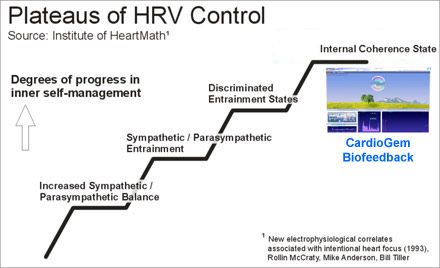

This eventually led to a much deeper understanding of the neural and other communication pathways between the heart and brain. It became clear that stressful or depleting emotions such as frustration and overwhelm lead to increased disorder in the higher-level brain centers and autonomic nervous system and which are reflected in the heart rhythms and adversely affects the functioning of virtually all bodily systems. Consistently, however, it was heart rate variability, or heart rhythms that stood out as the most dynamic and reflective indicator of one’s emotional states and, therefore, current stress and cognitive processes. Over the years, we have conducted many studies that have utilized many different physiological measures such as EEG (brain waves), SCL (skin conductance), ECG (heart), BP (blood pressure) and hormone levels, etc. In the early 1990s, we were among the first to conduct research that not only looked at how stressful emotions affect the activity in the autonomic nervous system (ANS) and the hormonal and immune systems, but also at the effects of emotions such as appreciation, compassion and care. Early on in our research we asked, among other questions, why people experience the feeling or sensation of love and other regenerative emotions as well as heartache in the physical area of the heart. For more than 25 years, the HeartMath Institute Research Center has explored the physiological mechanisms by which the heart and brain communicate and how the activity of the heart influences our perceptions, emotions, intuition and health. The heart has been considered the source of emotion, courage and wisdom for centuries.

We will highlight research that bridges the science of the heart and the highly practical, research-based skill set known as the HeartMath System. This overview will explore intriguing aspects of the science of the heart, much of which is still relatively not well known outside the fields of psychophysiology and neurocardiology.

All of these are important for increasing personal effectiveness, improving health and relationships and achieving greater fulfillment. Our research suggests the heart also is an access point to a source of wisdom and intelligence that we can call upon to live our lives with more balance, greater creativity and enhanced intuitive capacities. STEPHEN SCHAFER IS NOT A CO-AUTHOR Introduction New research shows the human heart is much more than an efficient pump that sustains life. THIS PUBLICATION-AUTHORED BY ROLLIN MCCRATY, RESEARCH DIRECTOR AT THE HEARTMATH INSTITUTE-DESERVES PRIORITY ATTENTION FROM RESEARCHERS WORKING ON ISSUES OF PLATO'S ASYMMETRICAOL SACRED GEOMETRY.


 0 kommentar(er)
0 kommentar(er)
